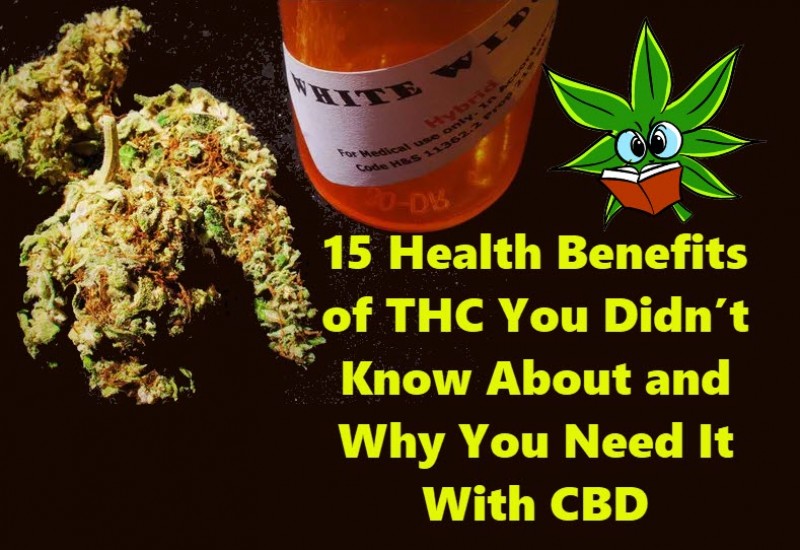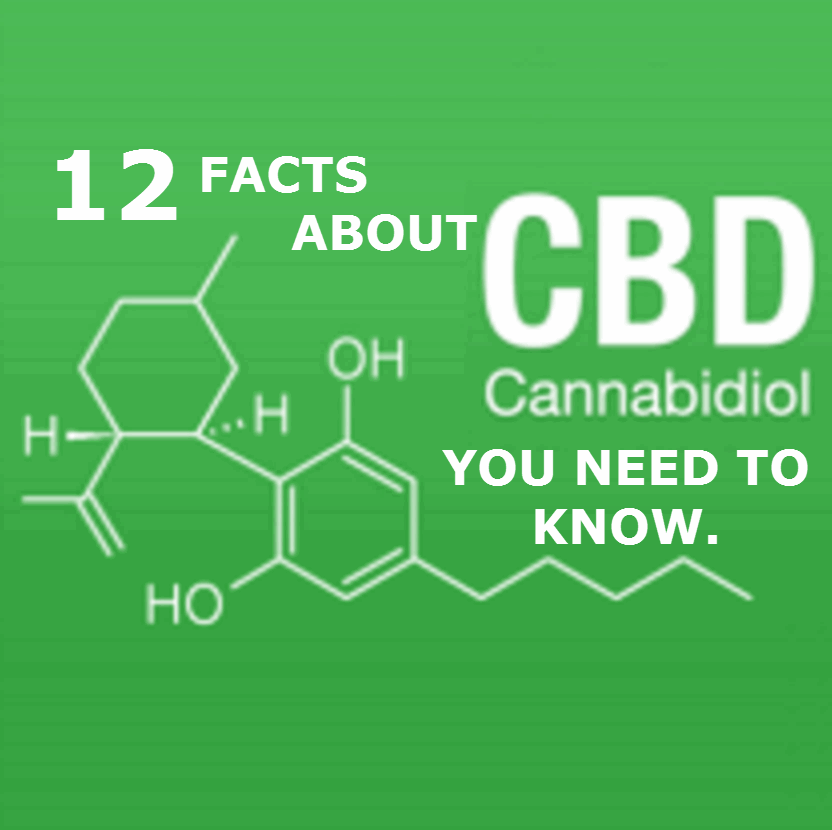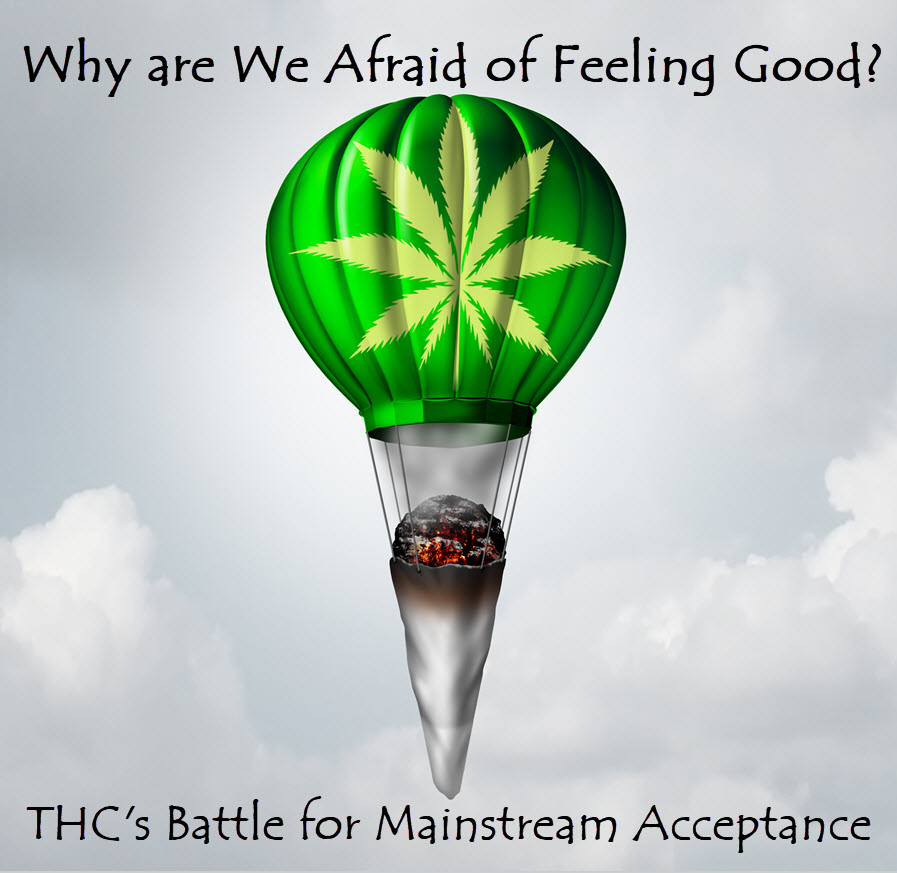15 Shocking Health Benefits Of THC You Didn’t Know About
THC Benefits That You Didn't Know About and Why You Need it with CBD from CannabisNet on Vimeo.
For the last few decades, cannabis was bred primarily for its ability to get you high. In other words, the stronger the strain, the better.
Breeders were cultivating cannabis for its THC content, or tetrahydrocannabinol, the compound responsible for making you feel high. But unfortunately, it’s a double-edged sword: THC is also the very same reason cannabis has been demonized. It’s the reason why prohibitionists came up with idiotic myths like cannabis makes you go crazy, it causes psychosis, makes you stupid, and so much more.
We know better today.
But the reputation of cannabis among recreational and medical users has been saved primarily due to the discovery of another valuable compound: cannabidiol (CBD), a non-psychoactive compound that is chock-full of medicinal benefits. Because of this, CBD products have saturated the market. The CBD industry only continues to grow bigger, and many even predict that CBD products may eventually eclipse those containing THC.
However, THC has some really valuable medicinal benefits, some of which can outdo CBD. Yes, it gets you high, but that’s not all that THC is good for.
Here are some surprising medical applications of THC you might not have known about:
- Pain relief: If there was one thing that THC is well known for in the medical arena, that’s its ability to knock out pain swiftly – even in low doses. You don’t need to get sky high just to enjoy its painkilling properties. While we’re only beginning to understand how it does so in the body, one study revealed that THC activates certain pathways in the central nervous system that inhibits pain signals from being transmitted to the brain.
- Inflammation: Inflammation, particularly chronic inflammation, is a huge risk factor for many diseases including those that can lead to death. These include cancer, arthritis, and even depression. But regularly consuming THC can prevent inflammation and stop it in its tracks. Research shows that THC does this by inhibiting the production of compounds called chemokine and cytokine, which are responsible for triggering the inflammatory response in the body. Whether you’re sick or not, you can benefit from consuming THC for this very reason, and along the way prevent harmful conditions from forming later on.
- Appetite loss: Certain medical conditions cause appetite loss, which leads to nutritional deficiencies and slows down the healing process. These include dementia, HIV, and hepatitis; aside from eating disorders and chemotherapy. Consuming THC is a safe and natural way to increase one’s appetite, because this compound interacts with the receptors located in the hypothalamus which releases ghrelin, a hormone that stimulates hunger. The appetite-inducing benefits of THC are more commonly known as “the munchies”, and while this is nothing more than a minor nuisance for recreational users, it’s life-saving for people who are unable to eat.
- Antioxidant: Stress is a silent killer. It affects even the healthiest individuals, and we’re prone to it at work, at home, and from the problems we’re handed by life. We all deal with stress differently: whether it’s by exercising or grabbing drinks after work, there’s no doubt that the one thing society can do with less of is stress. But THC is a powerful stress buster due its antioxidant properties; it’s no surprise why many individuals choose to light up after a hard day at work. Aside from physical and mental stress, THC protects us at the cellular level from oxidative stress, too much of which contributes to disease including visible aging on our skin. Overall, THC is helpful in protecting the body from many kinds of stress-related damage.
- Glaucoma: THC helps reduce the pressure in the eye which causes glaucoma. Without proper treatment, this condition leads to damage in the optic nerve and loss of vision. By using THC, glaucoma patients can prevent blindness.
- Muscle relaxant: Certain conditions cause muscle spasticity and tightness, cramping, and pain. This is why THC is so beneficial for multiple sclerosis and similar conditions that affect the muscles. THC has been shown to be effective in relaxing the muscles, plus it has the ability to reduce tension and cramps.
- Cancer: What we know about how cannabis prevents and treats cancer is only in its infancy. The growing mountain of evidence proving that cannabis can treat cancer only continues to increase, but so far we know that it does so in many different ways. One of the most novel ways that cannabis kills cancer cells is its ability to induce apoptosis, or cause cancer cells to commit suicide. THC has been shown to be effective in inducing apoptosis, as well as CBD and other cannabinoids.
- Lung health: Smoking cannabis isn’t exactly associated with improved lung health, but studies show that THC actually helps open up the airways in the lungs. This is why THC-rich cannabis is a great bronchodilator for asthma, COPD, and other lung conditions. However, it isn’t recommended or safe to smoke cannabis for the treatment of asthma. There are many other ways to medicate: edibles, vaporizing, oils, or tinctures are the best ways to treat asthma and lung problems without causing more damange to the lungs.
- Epilepsy: CBD has pretty much hogged the limelight over the last few years when it comes to epilepsy treatments. Perhaps it’s the safest way to treat epileptic children, but that doesn’t mean that THC has no value in treating this condition. THC also has anticonvulsant properties, especially when paired with CBD.
- Chemotherapy side effects: Cancer patients undergoing chemotherapy often experience debilitating side effects that affect their quality of life. Using cannabis products rich in THC alleviate these side effects especially nausea, vomiting, loss of appetite, and pain. In fact, the ability of THC to combat these chemotherapy side effects is so well known that the FDA has approved other synthetic drugs based on THC which are manufactured for treating these conditions alone.
- Cardiovascular disease: THC can actually help reduce the risk for cardiovascular disease in healthy people. Because of its ability to temporarily increase heart rate, it isn’t recommended for use in people who already have heart problems. But studies show that THC can inhibit the growth of atherosclerosis plaque, even when consumed in low amounts.
- Antibacterial: The THC content of cannabis makes it effective in killing bacteria. Ingesting or applying it topically can speed up healing from conditions caused by aggressive bacteria. Studies show that it’s even able to kill antibiotic-resistant pathogen even when other pharmaceutical drugs were not able to do the same.
- Cognitive benefits: Contrary to what prohibitionists say that smoking pot makes you dumb, research points to the fact that cannabis actually helps the brain in numerous ways. For one, it stimulates the growth of brain cells by activating CB1 receptors within the brain. In doing so, it promotes processes that improves the brain’s ability to learn. Studies have shown that THC also protects spatial memories. Even small doses of cannabis have been shown to be beneficial for Alzheimer’s patients as it slows down the progression of these diseases. Additionally, individuals who have suffered from head trauma can also benefit from THC’s ability to reduce swelling and inflammation in the brain, which otherwise could cause long-term damage to the brain.
- Insomnia: Proper sleep is critical for overall mental and physical health. However, sleep is more elusive than we think for a significant number of the population. With 50 to 70 million adults in the United States alone suffering from sleep disorders, it’s clear that without adequate treatment we’re a nation headed to sickness due to lack of proper sleep. But cannabis is a safe solution without resorting to harmful pharmaceutical meds or over-the-counter sleep aids which are addicting and for many, aren’t even effective. THC is not only advantageous for helping people fall and stay asleep because of its sedative properties, it’s also helpful for reducing the nightmares associated with PTSD, allowing people with this condition to get much-needed sleep.
- Increases insulin sensitivity: Studies show that cannabis use helps improve insulin sensitivity by reducing fasting insulin levels, thereby treating and preventing diabetes. It indicated that current cannabis use has been associated with 16% lower fasting insulin levels when compared to people who used cannabis in the past, and 26% lower fasting insulin levels compared to people who never consumed cannabis. The researchers observed the same results when analyzing other metrics for insulin sensitivity, which points to the fact that THC is helpful for restoring insulin sensitivity and glucose levels back to healthy levels.
So before you automatically discount THC, check these facts out. While CBD is definitely helpful for treating an impressive range of diseases and conditions, THC’s ability to do the same may actually surprise you. It’s no surprise that many people actually prefer THC to CBD for various reasons. So whether you are looking for cannabis medicine to support overall health or treat a specific condition, it’s worth exploring the world of therapeutic THC medications out there.
THC Benefits That You Didn't Know About and Why You Need it with CBD from CannabisNet on Vimeo.
OTHER STORIES YOU MAY ENJOY...
THC FACTS AND INFORMATION TO LEARN ABOUT, CLICK HERE.
OR..
CBD FACTS YOU NEED TO KNOW FIRST, CLICK HERE.









